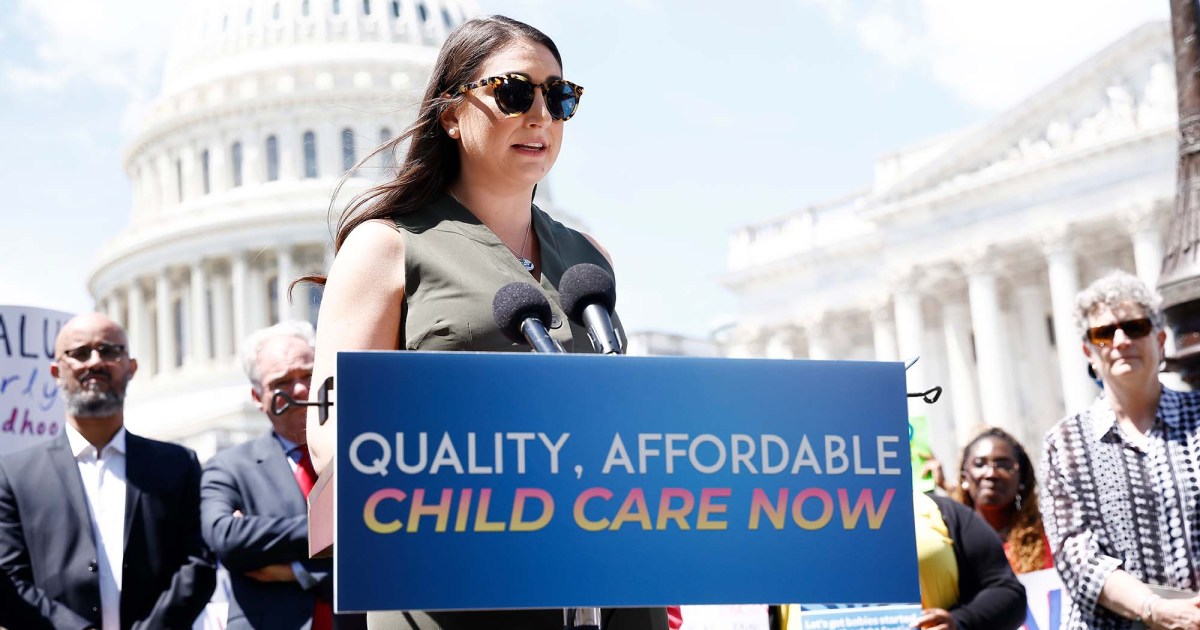With an estimated net worth of $76 million, Rep. Sara Jacobs (D-Calif.) is one of the top 15 wealthiest members of Congress. On Thursday, Jacobs, the granddaughter of a successful early tech entrepreneur, plans to introduce legislation that would—if enacted—work against her own self-interest.
The measure, which she discussed first with Mother Jones, is called the “Leveraging Estate Gains for America’s Children and Youth (LEGACY) Act” and proposes reducing the threshold at which very wealthy families pay taxes on their estates at death.
Congressional Republicans recently approved a $30 million minimum exemption for joint filers, meaning they don’t have to pay that tax until the assets being passed down exceed that sum. But Jacobs’s LEGACY Act would lower the threshold to $14 million for joint fillers and designate 15 percent of the increased revenue towards reducing childcare costs to no more than 7 percent of a family’s income.
“I think of it as taxing trust-fund kids,” says Jacobs, who identifies as one, “to create a trust fund for all American kids.”
Acknowledging that the LEGACY Act “won’t pass” with Republican control of both chambers, she argues that her timing isn’t just performative. Less than a week ago, President Donald Trump signed a sweeping reconciliation package that is expected to strip 3 million Americans from food stamps and cut Medicaid access for 11.8 million people. Meanwhile, the top 1 percent of households will receive an average tax cut of about $66,000, and an estimated $3.4 trillion will be added to the federal deficit over the next 10 years. (Financially speaking, Jacobs says she may benefit from the GOP package, but she still calls the bill “an abomination.”)
“The joke among people I know these days is that you know someone is making good money if they have a third kid.”
The GOP budget bill “cements and worsens income inequality and keeps people trapped in poverty or on the edges of poverty,” she says, “all to give wealthy people and corporations help that they don’t need.” In contrast, her proposed legislation presents an alternative economic playbook in which the wealthiest Americans pay more in taxes “to make sure that every kid has the opportunity to succeed in this country.”
“The whole Republican narrative,” Jacobs adds, “is that we have a scarcity of resources. But it’s not actually true. There’s plenty of resources—if we’re willing to actually tax them and use them.”
This is not just theoretical, for Jacobs, but personal. Her self-made billionaire grandfather, Irwin Jacobs, founded Qualcomm, a company that pioneered wireless communications in the 1980s. (The still-profitable company reported total assets above $55 billion in 2024.) Thanks to Qualcomm’s success, the Jacobs family heirs enjoy a sizable estate; decreasing the threshold at which estates are taxed, Jacobs says, would affect the inheritance she or her beneficiaries might receive in the future.
Increasing what’s owed to the government via estate taxes could be used for all kinds of government programs, but Jacobs says her bill directs some of the revenue to the childcare industry because of its untenable economic quandary: In 45 states plus Washington, DC, the cost of child care for two children is more than the average mortgage payment. Yet, the median pay for childcare workers is less than $33,000 per year, with many earning below the poverty line.
“It’s too expensive to provide childcare that’s both high quality and affordable for families, while paying providers a living wage,” Jacobs says, “and that’s why the government should step in.”
Among adults under 50 who say they are unlikely to have children, Pew Research Center reports that more than two-thirds say a key reason is their concerns about affordability, of which childcare is a major component.
Childcare affordability is also a major issue for parents who may be trying to decide whether or not they can afford to have more children. “The joke among people I know these days is that you know someone is making good money if they have a third kid,” says Jacobs.
For many families, the cost of childcare for three young children would exceed one parent’s wages, making it more economical for one parent to stay home and do the childrearing. A growing contingent of conservatives, including Vice President JD Vance, have suggested that mothers should prioritize raising their kids at home over chasing a career. But that perspective is restricted to only some families. In Trump’s Big Beautiful Bill, benefits for jobless people and their children were eviscerated.
“Republicans can’t decide if they hate people who are getting support, who aren’t working more, or if they want mothers to stay home more,” says Jacobs. “And so instead, we get bad policies.”
From Mother Jones via this RSS feed
Western countries be like that’s better than the movies while some eastern countries, Japan specifically, be like isn’t that common courtesy



